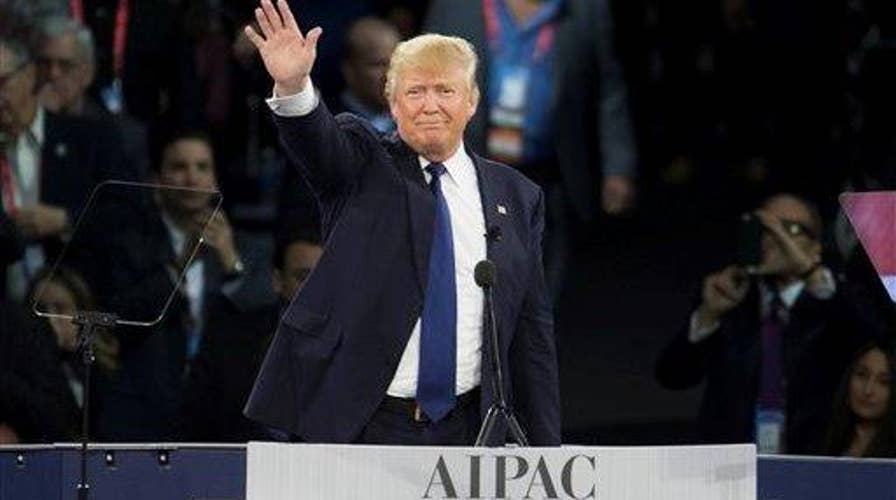Trump shows presidential side at AIPAC
Hillary Clinton made veiled challenges to Donald Trump's fitness to be president in speech before American Israel Public Affairs Committee. Trump had to prove he could be presidential. 'On the Record' panel breaks it down.
Republican presidential candidate Donald Trump on Monday pledged his firm support for Israel -- vowing that if elected the country would no longer be treated like a “second-class citizen” and calling Democratic rival Hillary Clinton a “total disaster” for America’s closest Middle East ally.
“When I become president, the days of treating Israel as a second-class citizen are over,” Trump said in his speech before the American Israel Public Affairs Committee, the country’s most influential pro-Israel group.
“Hillary Clinton … and President Obama have treated Israel very, very badly.”
The front-running Trump’s speech followed one by Clinton, Obama's onetime secretary of state, in which she challenged Trump’s commitment to the U.S.-Israel alliance, particularly his recent call to be “neutral” in peace talks involving Israel.
“We need steady hands -- not a president who says he’s neutral on Monday, pro-Israel on Tuesday and who knows what on Wednesday, because everything’s negotiable,” the Democratic front-runner said. “Israel’s security is non-negotiable.”
Trump said in February that he'd be "sort of a neutral guy" on peace talks between Israel and Palestinians. But on Monday, he pledged his full support.
“I’m a newcomer to politics but not in backing the Jewish state,” he said.
Like many Republicans, Trump bashed Obama’s recent deal with Israel's rival Iran, in which the rogue Middle East nation agreed to curtail its development of a nuclear weapon in exchange for the lifting of billions in economic sanctions.
“My number one priority is to dismantle the disastrous deal with Iran,” Trump said to applause. “It’s a bad deal.”
In a largely measured speech, Trump also argued that Iran is a “problem across the Middle East,” supplying weapons to an array of terror-related groups including Hezbollah, which he intends to eliminate.
“We will totally dismantle Iran’s global terror network,” Trump said. “Believe me.”
A planned walkout by some rabbis during Trump’s speech did not appear to happen.
Trump also said he would move the U.S. embassy from Tel Aviv to Jerusalem, “the eternal capital of the Jewish people.”
He drew boos last year from the Republican Jewish Coalition when he refused to take a stance on the embassy location.
Josh Block, a former AIPAC official who now heads The Israel Project, said before Trump’s speech that Trump has said a lot of things about Israel over the years -- “most of it favorable, but some of it more ambiguous." And he suggested that Trump’s speech would be a good opportunity for him to “address the ambiguity before a serious foreign policy audience."
Fellow GOP presidential candidates Ohio Gov. John Kasich and Texas Sen. Ted Cruz also spoke at the conference, delivering similar remarks in which they pledged their support for Israel, criticized the Iran nuclear deal and vowed to stop terrorism across the Middle East.
The only 2016 White House hopeful who did not attend the event was Democratic candidate Vermont Sen. Bernie Sanders, who remained on the campaign trail.
Like his fellow presidential candidates, Kasich tried to make a personal connection with the thousands in attendance, recalling a trip to Israel during the holiday season in which he called home to his mother.
“I remain unwavering in my support for the Jewish state and the partnership between the United States and Israel,” he said.
Kaisch said his support for Israel has been a constant during his 30 years as a lawmaker. And he promised, if elected, to defeat terror groups including the Taliban, Al Qaeda and the Islamic State.
Kasich says he would like to move the U.S. embassy to Jerusalem but that it’s not a priority.
He also said he would suspend the nuclear deal because Iran has already invalidated it with recent ballistic missile tests.
AIPAC bills itself as nonpartisan and has never endorsed a candidate.
Yet the organization has delved into highly partisan political debates over issues of interest to Israel, most recently and notably the nuclear deal, which it vehemently opposed.
Clinton and Sanders support the deal.
Cruz said he would move the U.S. Embassy to Jerusalem, a perennial Republican campaign promise.
“America will stand with Israel and defeat terror,” he added. “We need a president who will stand with Israel.”
Clinton, as secretary of state, oversaw the Obama administration's first attempt to broker an Israeli-Palestinian peace deal.
Her stance against Jewish settlements on land claimed by the Palestinians has been criticized by some in the pro-Israel community, but she has been received warmly by pro-Israel groups in the past.
The Associated Press contributed to this report.





